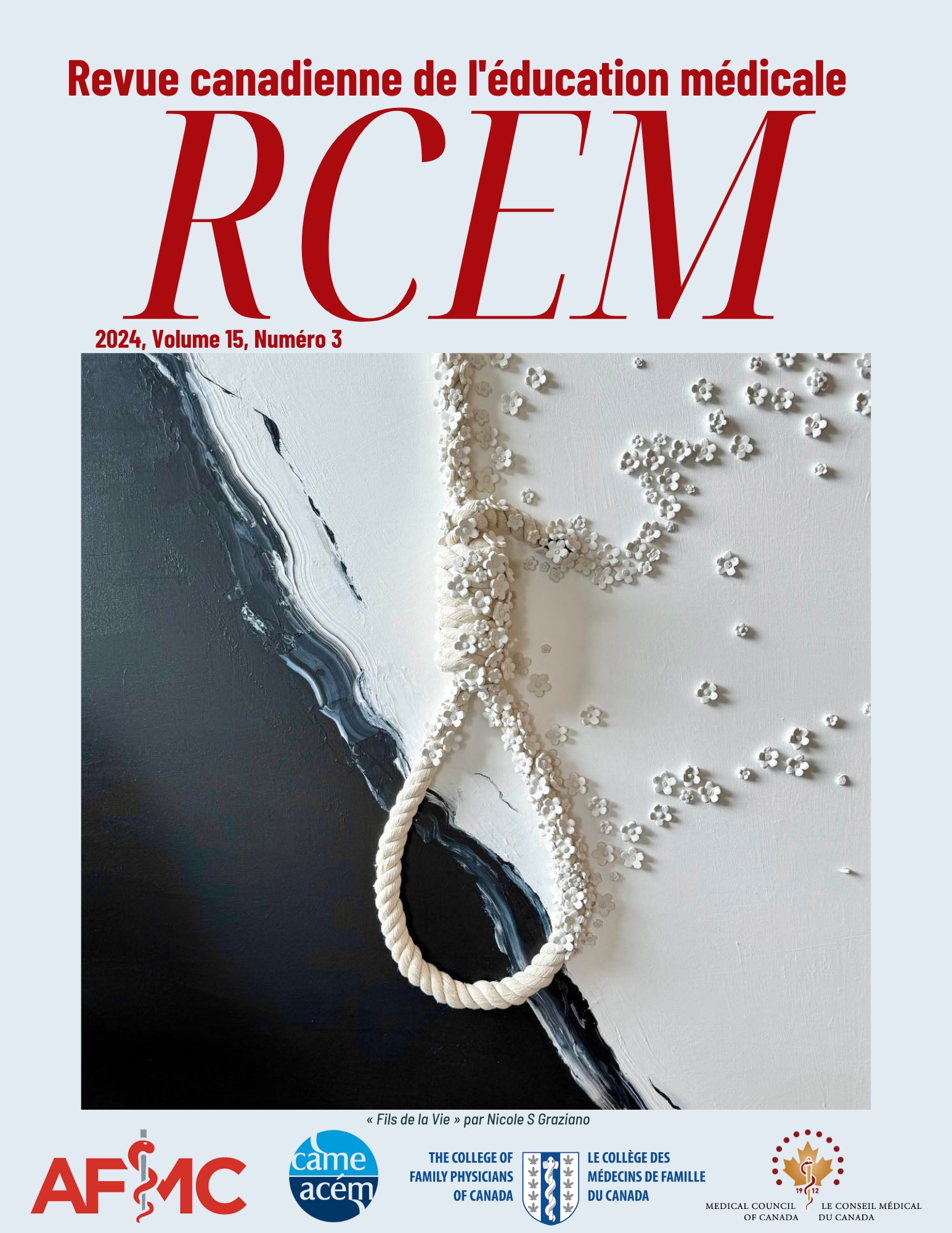Cinq façons d'aborder la notion de maîtriser le coût émotionnel personnel de l'annonce d'une mauvaise nouvelle
DOI :
https://doi.org/10.36834/cmej.78228Références
Baile WF, Buckman R, Lenzi R, Glober G, Beale EA, Kudelka AP. SPIKES-a six-step protocol for delivering bad news: application to the patient with cancer. Oncologist. 2000;5(4). https://doi.org/10.1634/theoncologist.5-4-302 DOI: https://doi.org/10.1634/theoncologist.5-4-302
Siraco S, Bitter C, Chen T. breaking bad news in the emergency department. J Educ Teach Emerg Med. 2022;7(2). https://doi.org/10.5070/M57257168 DOI: https://doi.org/10.5070/M57257168
Al-Mateen CS, Linker JA, Damle N, Hupe J, Helfer T, Jessick V. Vicarious traumatization and coping in medical students: a pilot study. Acad Psych. 2015;39(1). https://doi.org/10.1007/s40596-014-0199-3 DOI: https://doi.org/10.1007/s40596-014-0199-3
Fu W, Agarwal A, Chow E, Henry B. The impact of breaking bad news on oncologist burnout and how communication skills can help: a scoping review. Vol. 10, J Pain Manag. 2017.
Keefe-Cooperman K, Savitsky D, Koshel W, Bhat V, Cooperman J. The PEWTER Study: breaking bad news communication skills training for counseling programs. Int. J. Adv. Couns. 2018;40(1). https://doi.org/10.1007/s10447-017-9313-z DOI: https://doi.org/10.1007/s10447-017-9313-z
Francis L, Robertson N. Healthcare practitioners' experiences of breaking bad news: A critical interpretative meta synthesis. Vol. 107, Patient Educ Counsel. 2023. https://doi.org/10.1016/j.pec.2022.107574 DOI: https://doi.org/10.1016/j.pec.2022.107574
Toivonen AK, Lindblom-Ylänne S, Louhiala P, Pyörälä E. Medical students' reflections on emotions concerning breaking bad news. Patient Educ Couns. 2017;100(10). https://doi.org/10.1016/j.pec.2017.05.036 DOI: https://doi.org/10.1016/j.pec.2017.05.036
Brown R, Dunn S, Byrnes K, Morris R, Heinrich P, Shaw J. Doctors' stress responses and poor communication performance in simulated bad-news consultations. Acad Med. 2009;84(11). https://doi.org/10.1097/ACM.0b013e3181baf537 DOI: https://doi.org/10.1097/ACM.0b013e3181baf537
Earnshaw GJ. Mentorship: the students' views. Nurse Educ Today. 1995;15(4). https://doi.org/10.1016/S0260-6917(95)80130-8 DOI: https://doi.org/10.1016/S0260-6917(95)80130-8
Sherwood M, Rioux D, Knight R, et al. Increasing undergraduate exposure to oncology: the role of oncology interest groups. J Cancer Educ. 2020;35(5). https://doi.org/10.1007/s13187-019-01554-x DOI: https://doi.org/10.1007/s13187-019-01554-x
Karnieli-Miller O, Palombo M, Meitar D. See, reflect, learn more: qualitative analysis of breaking bad news reflective narratives. Vol. 52, Med Educ. 2018. https://doi.org/10.1111/medu.13582 DOI: https://doi.org/10.1111/medu.13582
Rosenzweig MQ. Breaking bad news: a guide for effective and empathetic communication. Nurse Pract. 2012;37(2). https://doi.org/10.1097/01.NPR.0000408626.24599.9e DOI: https://doi.org/10.1097/01.NPR.0000408626.24599.9e
Mair MJ, Cardone C, Connolly L, et al. Career and professional development for young oncologists. Vol. 46, Oncol Res Treatment. 2023. https://doi.org/10.1159/000528541 DOI: https://doi.org/10.1159/000528541
Kim J, Chesworth B, Franchino-Olsen H, Macy RJ. A scoping review of vicarious trauma interventions for service providers working with people who have experienced traumatic events. Vol. 23, Trauma, Violence, and Abuse. 2022. https://doi.org/10.1177/1524838021991310 DOI: https://doi.org/10.1177/1524838021991310
Delaney MC. Caring for the caregivers: evaluation of the effect of an eight-week pilot mindful self-compassion (MSC) training program on nurses' compassion fatigue and resilience. PLoS One. 2018;13(11). https://doi.org/10.1371/journal.pone.0207261 DOI: https://doi.org/10.1371/journal.pone.0207261
George LS, Prigerson HG, Epstein AS, et al. Palliative chemotherapy or radiation and prognostic understanding among advanced cancer patients: the role of perceived treatment intent. J Palliat Med. 2020;23(1). https://doi.org/10.1089/jpm.2018.0651 DOI: https://doi.org/10.1089/jpm.2018.0651
Lakin JR, Arnold CG, Catzen HZ, et al. Early serious illness communication in hospitalized patients: a study of the implementation of the speaking about goals and expectations (SAGE) program. Healthcare. 2021;9(2). https://doi.org/10.1016/j.hjdsi.2020.100510 DOI: https://doi.org/10.1016/j.hjdsi.2020.100510
Paladino J, Sanders JJ, Fromme EK, et al. Improving serious illness communication: a qualitative study of clinical culture. BMC Palliat Care. 2023;22(1). https://doi.org/10.1186/s12904-023-01229-x DOI: https://doi.org/10.1186/s12904-023-01229-x
Sanatani M. Different ways of traveling the cancer road - daytime running lights at night? Vol. 9, JAMA Oncol. 2023. https://doi.org/10.1001/jamaoncol.2022.7143 DOI: https://doi.org/10.1001/jamaoncol.2022.7143
Ahmed N, Sadat M, Cukor D. Sleep knowledge and behaviors in medical students: results of a single center survey. Acad Psych. 2017;41(5). https://doi.org/10.1007/s40596-016-0655-3 DOI: https://doi.org/10.1007/s40596-016-0655-3
https://doi.org/10.1111/hex.13478 DOI: https://doi.org/10.1111/hex.13478
Moon J. Learning journals and logs, reflective diaries. Centre for Teaching and Learning Good Practice in Teaching and Learning. 2003;
Preti B, Lakkunarajah S, Sanatani MS. The oncology ribbon of reflection: a novel tool to encourage trainee self-reflection. Can Med Educ J. 2023; https://doi.org/10.36834/cmej.77302 DOI: https://doi.org/10.36834/cmej.77302
Téléchargements
Publié
Numéro
Rubrique
Licence
© Beatrice TB Preti, Michael SS Sanatani 2023

Cette œuvre est sous licence Creative Commons Attribution - Pas d'Utilisation Commerciale - Pas de Modification 4.0 International.
La soumission d’un manuscrit original à la revue constitue une indication qu’il s’agit d’un travail original, qu’il n’a jamais été publié et qu’il n’est pas envisagé pour publication dans une autre revue. S’il est accepté, il sera publié en ligne et ne pourra l’être ailleurs sous la même forme, à des fins commerciales, dans quelque langue que ce soit, sans l’accord de l’éditeur.
La publication d’une recherche scientifique a pour but la diffusion de connaissances et, sous un régime sans but lucratif, ne profite financièrement ni à l’éditeur ni à l’auteur.
Les auteurs qui publient dans la Revue canadienne d’éducation médicale acceptent de publier leurs articles sous la licence Creative Commons Paternité - Pas d’utilisation commerciale, Pas de modification 4.0 Canada. Cette licence permet à quiconque de télécharger et de partager l’article à des fins non commerciales, à condition d’en attribuer le crédit aux auteurs. Pour plus de détails sur les droits que les auteurs accordent aux utilisateurs de leur travail, veuillez consulter le résumé de la licence et la licence complète.











